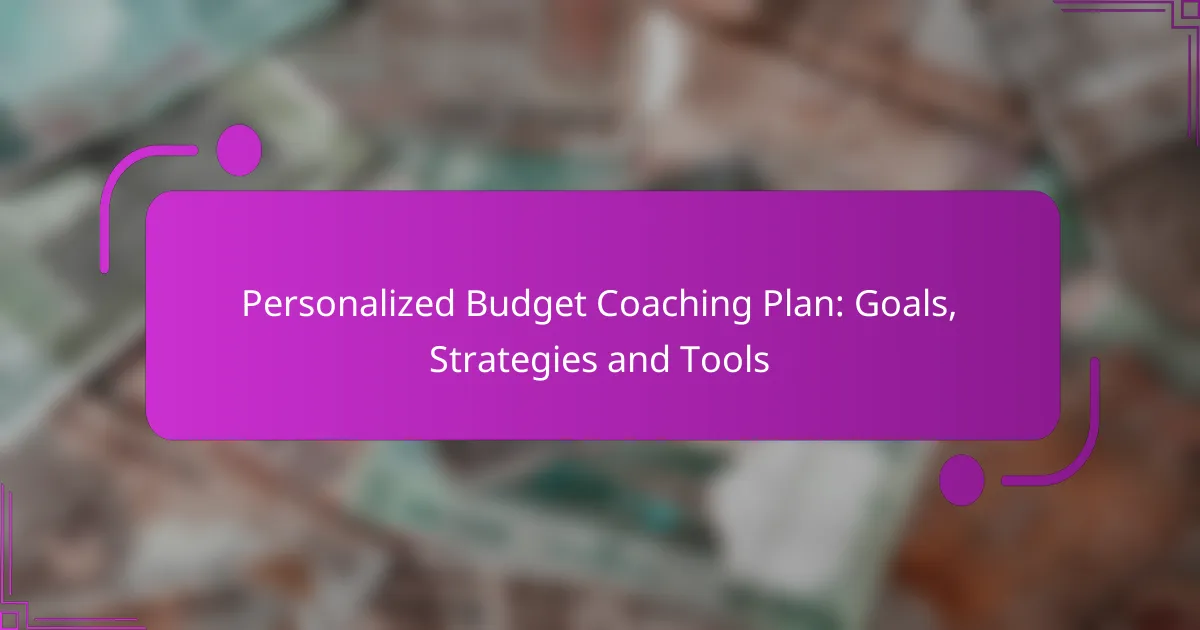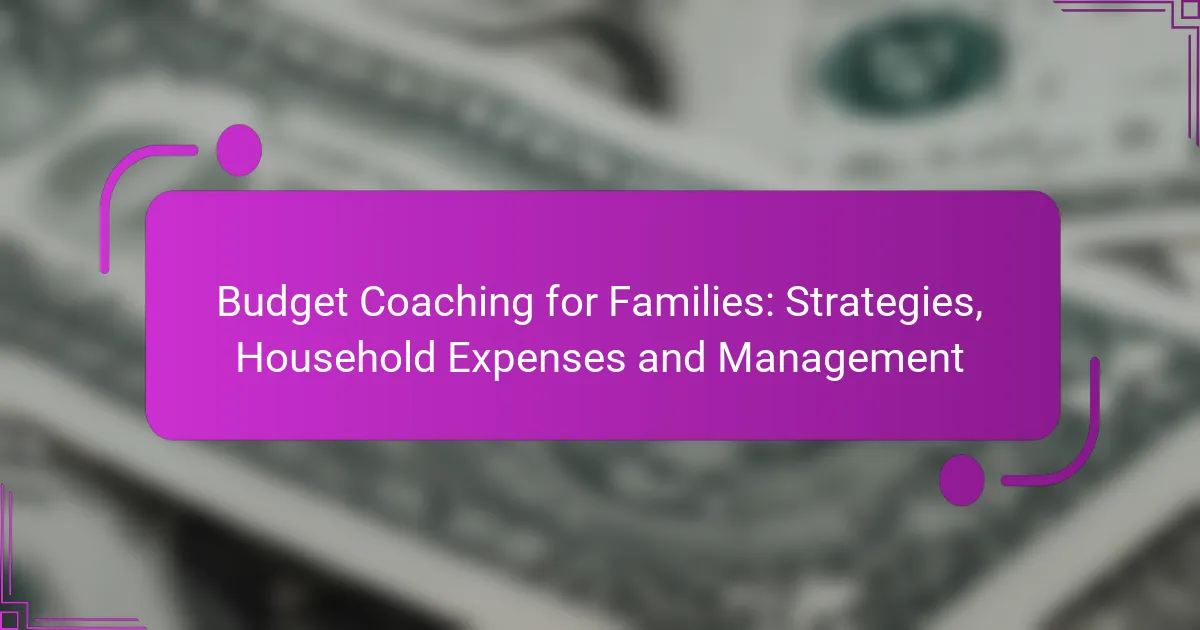Personalized budget coaching offers tailored guidance to help you achieve your financial goals by focusing on your unique situation. By setting clear objectives, tracking expenses, and utilizing effective budgeting tools, you can gain control over your finances and make informed decisions that align with your lifestyle.

How can personalized budget coaching help you achieve financial goals?
Personalized budget coaching can significantly enhance your ability to reach financial goals by providing tailored guidance and strategies. This approach focuses on your unique financial situation, helping you create a realistic budget that aligns with your objectives and lifestyle.
Tailored financial strategies
Personalized budget coaching offers customized financial strategies that cater to your specific needs and goals. Coaches assess your income, expenses, and financial aspirations to develop a budget that works for you, whether it’s saving for a home, paying off debt, or planning for retirement.
For example, if you aim to save for a vacation, a coach might recommend allocating a certain percentage of your monthly income towards a dedicated savings account. This targeted approach ensures that your financial plan is both practical and achievable.
Accountability and support
Having a budget coach provides essential accountability and support, which can be crucial for staying on track with your financial goals. Regular check-ins and progress assessments help you remain committed to your budget and make necessary adjustments along the way.
Coaches can help you identify potential pitfalls, such as overspending in certain categories, and offer strategies to overcome these challenges. This ongoing support fosters a sense of responsibility and encourages you to maintain discipline in your financial habits.
Improved money management skills
Personalized budget coaching not only helps you create a budget but also equips you with valuable money management skills. Coaches often teach techniques for tracking expenses, understanding cash flow, and making informed financial decisions.
By learning these skills, you can better navigate your financial landscape, making it easier to adjust your budget as circumstances change. For instance, understanding how to prioritize needs versus wants can lead to more effective spending habits and long-term financial stability.

What strategies are effective in personalized budget coaching?
Effective strategies in personalized budget coaching include setting clear financial goals, tracking expenses meticulously, and utilizing budgeting tools. These approaches help individuals gain control over their finances and make informed decisions about spending and saving.
Goal setting techniques
Goal setting techniques involve defining specific, measurable, achievable, relevant, and time-bound (SMART) objectives. For instance, instead of saying “I want to save money,” a SMART goal would be “I want to save $5,000 for a vacation by next December.” This clarity helps maintain focus and motivation.
Consider breaking larger goals into smaller milestones. For example, if your goal is to save for a home down payment, set monthly savings targets that gradually lead to your overall objective. This method allows for tracking progress and making adjustments as needed.
Expense tracking methods
Expense tracking methods are essential for understanding where your money goes. Common approaches include maintaining a daily spending journal, using spreadsheets, or employing mobile apps designed for expense tracking. Each method has its benefits, but digital solutions often provide easier categorization and analysis.
Regularly review your expenses to identify patterns and areas for improvement. For example, if you notice high spending on dining out, consider setting a monthly limit and exploring cooking at home as a cost-saving alternative. This awareness can lead to more conscious spending decisions.
Budgeting tools and apps
Budgeting tools and apps can simplify the budgeting process by automating calculations and providing visual insights into your financial situation. Popular options include Mint, YNAB (You Need A Budget), and PocketGuard, each offering unique features tailored to different budgeting styles.
When selecting a budgeting tool, consider factors such as ease of use, integration with your bank accounts, and whether it supports your financial goals. Many apps offer free versions with essential features, making it easy to start without a financial commitment. Regularly update your budget within these tools to reflect changes in income or expenses for optimal effectiveness.

What tools can enhance your budget coaching experience?
Several tools can significantly improve your budget coaching experience by providing insights, tracking expenses, and facilitating proactive financial planning. Utilizing these tools can help you stay organized and make informed decisions about your finances.
Mint for expense tracking
Mint is a popular tool for tracking expenses and managing your budget in real-time. It connects to your bank accounts and credit cards, automatically categorizing transactions to give you a clear view of your spending habits.
To get started with Mint, simply create an account and link your financial accounts. The platform will generate reports and visualizations to help you identify areas where you can cut back. Regularly reviewing these insights can help you stay on track with your budget.
YNAB for proactive budgeting
You Need A Budget (YNAB) is designed to encourage proactive budgeting by promoting the concept of giving every dollar a job. This tool helps you allocate your income to specific categories, ensuring that you are prepared for both expected and unexpected expenses.
With YNAB, you can set financial goals and track your progress over time. The software emphasizes the importance of adjusting your budget as needed, which can help you avoid overspending. Consider using YNAB if you want to take a more hands-on approach to your financial planning.
Personal Capital for investment tracking
Personal Capital is an excellent tool for tracking investments and managing your overall financial health. It provides a comprehensive view of your assets, liabilities, and net worth, allowing you to see how your investments are performing over time.
To utilize Personal Capital effectively, link your investment accounts and set up your financial goals. The platform offers tools for retirement planning and asset allocation analysis, helping you make informed decisions about your investment strategy. Regularly reviewing your portfolio can help you stay aligned with your long-term financial objectives.

How to choose the right budget coach?
Choosing the right budget coach involves evaluating their qualifications, client feedback, and compatibility with your personal style. A good budget coach should align with your financial goals and provide tailored strategies to help you achieve them.
Qualifications and certifications
When selecting a budget coach, consider their qualifications and certifications. Look for coaches who have credentials from recognized financial coaching organizations, such as the Financial Planning Association or the National Association of Personal Financial Advisors.
Additionally, relevant experience in financial planning or personal finance can enhance a coach’s ability to provide effective guidance. Ask potential coaches about their education and any specialized training they have completed.
Client testimonials and reviews
Client testimonials and reviews are crucial in assessing a budget coach’s effectiveness. Look for feedback on their website or third-party review platforms to gauge the experiences of previous clients.
Pay attention to comments about the coach’s communication style, the clarity of their strategies, and the overall satisfaction of clients. Positive reviews can indicate a coach’s ability to foster trust and deliver results.
Coaching style and compatibility
Coaching style and compatibility play a significant role in the success of your budgeting journey. Some coaches may adopt a more hands-on approach, while others might offer guidance and let you take the lead.
Consider scheduling an initial consultation to discuss your financial goals and see how well the coach’s style aligns with your preferences. A good fit can enhance motivation and accountability, making it easier to stick to your budget.

What are the costs associated with personalized budget coaching?
The costs of personalized budget coaching can vary widely based on the coach’s experience, the services offered, and the duration of the coaching engagement. Generally, clients can expect to pay hourly rates or opt for package deals that bundle multiple sessions together.
Hourly rates for coaches
Hourly rates for budget coaches typically range from $50 to $200 per hour, depending on their expertise and location. Newer coaches may charge lower rates, while seasoned professionals with specialized skills might command higher fees.
When considering hourly coaching, it’s essential to assess what each coach offers during that time. Some may provide comprehensive financial planning, while others focus solely on budgeting strategies.
Package pricing options
Many budget coaches offer package pricing, which can be more cost-effective than hourly rates. Packages often include a set number of sessions, ranging from three to ten, and may also provide additional resources like budgeting tools or personalized financial plans.
For example, a package might cost between $300 and $1,500, depending on the number of sessions and the depth of services included. Clients should evaluate the value of the package against their specific financial goals.
Free initial consultations
Many budget coaches offer free initial consultations to help potential clients assess their needs and determine if the coach is a good fit. These consultations typically last around 30 minutes to an hour and provide an overview of the coaching process.
During the consultation, clients can ask questions about pricing, coaching methods, and expected outcomes. Taking advantage of these free sessions can help clients make informed decisions before committing to a coaching plan.

What are the benefits of local budget coaching services?
Local budget coaching services provide personalized guidance to help individuals manage their finances effectively. These services often leverage community knowledge and resources, making them particularly relevant for local economic conditions.
In-person consultations
In-person consultations offer a tailored approach to budgeting, allowing coaches to assess individual financial situations directly. This face-to-face interaction fosters trust and enables coaches to provide immediate feedback and support.
During these sessions, clients can discuss specific financial goals, such as saving for a home or reducing debt. Coaches can help create actionable plans that align with local cost-of-living factors, ensuring strategies are realistic and achievable.
Community resources and workshops
Local budget coaching services often connect clients with community resources and workshops that enhance financial literacy. These workshops may cover topics like debt management, savings strategies, and investment basics, providing valuable knowledge in a group setting.
Participating in community workshops can also lead to discovering local financial programs or grants, which can be beneficial for those in need. Engaging with others facing similar challenges can motivate individuals to stay committed to their financial goals.
Networking opportunities
Networking opportunities through local budget coaching services can significantly enhance financial growth. Coaches often facilitate connections with other clients, local businesses, and financial experts, creating a supportive community.
Building a network can lead to collaborative learning and sharing of resources, such as finding local deals or investment opportunities. Engaging with a diverse group can also provide different perspectives on budgeting strategies, enriching the overall coaching experience.



